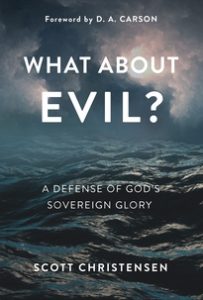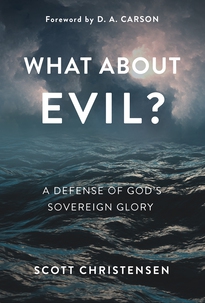Christensen, Scott. What about Evil? A Defense of God’s Sovereign Glory. Phillipsburg, New Jersey: P&R Publishing, 2020, pp. 544, $30, hardback.
Scott Christensen, is the author of the highly acclaimed What about Free Will?, foreword by D.A. Carson (P&R, 2016). Scott worked for nine years at the award-winning CCY Architects in Aspen, Colorado; several of his home designs were featured in Architectural Digest magazine. Called out of this work to the ministry, he graduated with his MDiv from The Masters Seminary with honors. He pastored Summit Lake Community Church in southwest Colorado for sixteen years and now serves as the associate pastor of Kerrville Bible Church in Kerrville, Texas.
What About Evil?, by Scott Christensen, is a theologically rich resource that provides a defense of God’s sovereign glory and a reason for why God allows evil in the world. In seeking to answer the problem of evil, Christensen provides a robust solution that he calls the Greater-Glory Theodicy. In combining aspects of the Greater-Good Theodicy and fragments of the Best-of-All Possible Worlds Defense, the Greater-Glory Theodicy seeks to resolve the problem of evil in the backdrop of studying what brings God the greatest glory (p. 7). Christensen argues that Jesus’ redemptive work on Calvary is the work that most magnifies God’s glory, therefore, for Christ’s work to be necessary, there must be a good world that has been ruined by evil and calls out for restoration (p. 7).
In his introduction, Christensen takes a reformed perspective in arguing that the fall of humanity was no mistake but was planned by God to bring about the greater good of redemption (pg. 8). Christensen begins to exposit his thesis in the first section (chapters 2 – 6) by examining how the historical record has sought to answer the problem of evil. He demonstrates why past defenses and theodicies have lacked certain qualities that downplay God’s sovereignty, aseity, and omnipotence, specifically critiquing the Free-Will Defense. He then shifts in the second section (chapters 7 – 9) to extoling God’s meticulous sovereignty and power as the transcendent God of the universe and addresses some issues of how one understands the relationship between divine sovereignty and human responsibility. The heart of the book can be found in the third section (ch. 10-13) where he frames the Greater-Glory Theodicy in a monomyth narrative and provides a biblical defense for his theodicy. Christensen concludes the last section (chapters 14 – 17) by describing Jesus’ redemptive work on the cross and the importance of his incarnation to be the perfect substitute to accomplish God’s cosmic plan of salvation.
Probing more into Christensen’s thesis, that the greatest good is what will bring God the greatest glory (p. 281), he provides numerous examples from scripture that strengthen his argument. Psalm 115:3 and Romans 11:36 proclaim that God is free to create the world in any way He desires, and He specifically chooses to create the world for his glory and pleasure (p. 286). Christensen says, “Everything-absolutely everything Christ made-is ‘for him,’ to magnify his glory (Col. 1:16; 1 Cor. 8:6; Heb 2:10, p. 289).” Christensen’s God-Centered Theodicy exemplifies the specific need for people to know they are not the center of the universe and that God’s ultimate purpose is not to make man materialistically happy, but to glorify himself (p. 292). Ironically, this God-Centeredness is the vehicle that provides man with ultimate satisfaction and eternal happiness as Christensen concludes that God’s glory is our good for it is God’s desire to glorify himself that leads to him constructing and bringing about his plan of the redemption of his people through the blood of Jesus (pg. 294).
One inimitable aspect of Christensen’s argument is the use of describing God’s story of redemption as a monomyth. Building on J.R.R. Tolkien’s dialogue with C.S. Lewis decades before, Christensen says that the fundamental storyline of the Bible is how God’s glory is magnified in his response to evil through the sending of a redeemer, his beloved Son, Jesus Christ (p. 260). Christensen uses Freytag’s Pyramid that distinguishes the different plot points of a story to map out how the “One True Story” of the Bible falls nicely into Freytag’s five categories. In contrast to traditional stories of monomyth, the Biblical storyline does not follow a u-shaped storyline (where the blissful state at the beginning is ruined by a tragedy, only to be restored to its original paradisical state in the conclusion), but instead follows what Christensen calls a “J-shaped storyline” (pg. 285). This J-shaped storyline demonstrates that the conclusion of redemption in Christ and his work of overcoming the crisis of the fall is greater and more glorious than the original state of paradise at creation. The J-shaped storyline further buttresses Christensen’s Theodicy that the Fall and evil were “fortunate” to bring about an exceedingly greater good for mankind. In this acknowledgement, Christensen aligns himself Alvin Plantinga, who also argues for a theodicy utilizing the felix culpa motif. However, different from Christensen, Plantinga champions a free-will defense even though supralapsarianism (which is associated with a felix culpa theodicy) is traditionally more aligned and coherent with a reformed Calvinist perspective of theology (p. 299). Christensen claims that the reason for this incoherency with Plantinga may be due to him being raised as a Dutch Reformed Christian that held to a reformed view of the divine decrees (p. 300).
What About Evil?, is a book that adds tremendous value to the field of theology and apologetics for the theologian who is seeking to sharpen his or her knowledge of how to reconcile God’s divine sovereignty with human responsibility. Most readers will benefit specifically from Christensen’s critique of the commonly held Free-Will Defense. Christensen provides a charitable demonstration of the Free-Will Defense by listing its strengths and weaknesses but then demonstrates why it seems to fall short when examining the biblical data and storyline of Scripture in comparison to a compatibilist view of freedom; in both a compatibilism between divine decree and foreknowledge with human freedom.
Although not a key point in the book, readers will find the explanation of the necessity of Jesus’ incarnation to fully to accomplish the work of redemption for mankind’s good and God’s glory extremely helpful. Specifically, Christensen provides practical truth of how a Christian can cope with the problem of evil when he discusses the impassibility of God. Despite misconceptions about divine impassibility, Christensen communicates a high Christology making clear distinctions between God having affections but not having passions. By leaning on Scripture and the Reformers, Christensen demonstrates that Jesus in His divine nature did not suffer; but, in His humanity, he fully suffered and can sympathize with our weaknesses being our great High Priest (p. 378-389).
The audience most suited for this theological treatise would be a student, teacher, or pastor of higher education and/or training. The book is very steep in its doctrine and would be difficult to digest for the beginner in theology or average lay person of a church. As students interact with the book, they should specifically look for how Christensen methodically highlights the glory, grandeur, and transcendence of the Triune God in every chapter. Students should prepare for a rigorous dive into some difficult and heart wrenching questions about God, evil, and the Bible’s solution, being prepared to change one’s views if compelled.
Andrew Slay
New Orleans Baptist Theological Seminary





